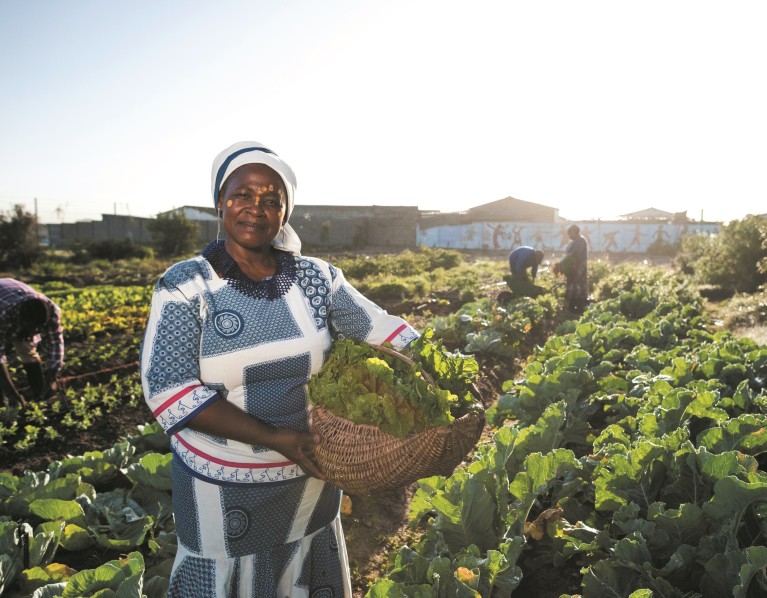
© MINT IMAGES/MINT IMAGES RF/GETTY IMAGES
Although hunger was steadily declining for decades, progress stalled in 2015 and since then, the number of people who suffer from hunger has slowly increased. In 2018, there were more than 820 million people hungry. Around 2 billion people worldwide have micronutrient deficiencies and 149 million children are stunted. And yet in 2018, 40 million children under five were overweight, and in 2016, 2 billion adults were overweight, with a third of these obese. Many countries are now challenged by what’s known as the double burden of malnutrition (DBM), in which people are simultaneously overweight and malnourished.
The double burden of malnutrition is closely associated with nutrition transition which is tracking both demographic transition (where countries shift from patterns of high to lower fertility and mortality) and epidemiological transition (where the prevalent disease burden shifts from infectious to chronic and degenerative disease). With urbanization, economic growth and technological change, diets shift from starchy, low variety, low fat and high fibre towards the ‘Western’ pattern of increased fat, sugar and processed foods. The effects of malnutrition have also been shown to be intergenerational, where maternal nutrition can set a trajectory for life-long health of her offspring.
In the 1990s, DBM mostly affected the highest income countries of the group of low- and middle-income countries (LMICs), but in the last decade it has been seen in even the poorest of countries, including in rural areas and in people with low incomes. DBM is seen in around 14 million children in Asia and 9.6 million children in Africa.
Syndemics
The global synergistic epidemic — the ‘syndemic’ — of overnutrition, undernutrition and climate change was described as the greatest challenge for human and planetary health in the 21st century and has been compounded by unprecedented challenges to food and nutrition security in 2020. In the biggest upsurge seen in decades, desert locust outbreaks in East Africa and South Asia have had disastrous effects on local food supplies. COVID-19 — a pandemic inextricably linked in cause and effect to food systems — could push up to 100 million people into extreme poverty. Lockdowns to deal with the spread of COVID-19 disrupted global supply chains and national, local and household economies. With the increase in poverty, and hindrance of essential interventions and food security, COVID-19 could reverse many of the hard-won gains in maternal and child nutrition of recent decades. Furthermore, overweight and obesity are associated with increased likelihood of hospitalization, ICU admission and worse outcomes in COVID-19.
Building solutions
It is now evident that human and planetary health cannot be disentangled, nor can nutrition be considered in isolation from the food system. The food system concept, as put forward by Parsons and Hawkes describes the interplay between the food supply chain and social, political, economic and environmental outcomes. It puts the individual at the core and yet, power concentrations within the food system exist and markedly skew the attainment of health and sustainable and affordable diets for all. Malnutrition is a consequence.

Economic, social, political and other factors determine what people eat.(From top left to bottom right) © MONKEYBUSINESSIMAGES/ISTOCK / GETTY IMAGES PLUS; © SCIENCE PHOTO LIBRARY/GETTY IMAGES; © SZEFEI/SHUTTERSTCOK; © PEETERV/ISTOCK / GETTY IMAGES PLUS
Meanwhile, nutrition remains everyone’s business. Food systems are a major source of livelihoods globally. It is estimated that one in three workers are employed in the agricultural sector alone. A Chatham House report showed that businesses in 19 countries lose up to an estimated US$38 billion a year from lost worker productivity because of undernutrition, and up to an estimated US$27 billion a year because of obesity. The authors conclude there is an incentive for the food industry to invest in better nutrition, because it could drive a stronger and more productive economy generally, as well as helping its own productivity. Around 80% of food is produced by the private sector (mostly small- and medium-sized enterprises) meaning communication of the benefits of transformation will need to be multi-faceted, multi-sectoral, long-term campaigns.
Within that transformation, food systems geared towards nutrition must also be geared towards sustainability. The food system contributes about one-third of anthropogenic greenhouse gas emissions, diminishes biodiversity, pollutes water and degrades soil.
And the damage caused by the climate emergency will exacerbate changing diets. Around two-fifths of the world’s population is unable to afford a healthy diet. This has a huge impact on the health of the population, as poor diet, whether undernutrition or over-consumption, plays a significant role in health and health risks. Dietary changes are driven by a country’s wealth and level of urbanization, and dictated by increasing inequalities in society. The disruption to food supply as a result of climate change will only serve to throw up further challenges to providing nutrition for all.
At the Food Systems for Nutrition and Health workshop held in advance of the 2021 Nutrition for Growth Summit in Tokyo, three breakout sessions considered the role of policy, the role of the private sector and the role of the nutrition research community in bringing about necessary change to global food systems in order to provide healthy, nutritious and sustainable diets for all. While each session came at the challenge from different angles, a common theme was the need for collaborative, multi-stakeholder approaches to change. The reports continue below.
Breakout session: Nutrition for health
Effecting change in a fractured landscape
The double burden of malnutrition (DBM) — the combination problem of both too many calories and simultaneous malnutrition — is increasing in low- and middle-income countries. This, along with the climate emergency and COVID-19 pandemic, is having a significant impact on global health and increasing the risk of non-communicable diseases.
The Nutrition for Health breakout session of the Food Systems for Nutrition and Health workshop, comprised of experts from industry, government and academia, discussed existing policies to tackle DBM. Examples include Ghana’s ‘Planting for food and jobs’, which has helped communities to expand their land use, and community dams that support fish farms and improve land irrigation. Japan worked to improve undernutrition following the Second World War, and overweight and obesity following economic growth, through education and improving access to healthy and nutritious food, including for low-income populations as part of universal health coverage.
Tackling DBM needs behaviour change of all food system actors and consumers, backed by a deep understanding of what drives people’s decisions in nutrition and health. All stakeholders, including governments, companies, the World Health Organization, the UN Food and Agriculture Organization, the International Union of Nutritional Sciences, non-government organizations and policy makers, will need to be involved to facilitate behavioural change and provide food environments that incentivize healthy eating. Government approaches could include taxing highly-processed foods and sugary drinks, improving transport infrastructure for affordable delivery of food, providing safety nets for consumers who cannot afford a healthy diet, investing in public awareness campaigns, and making nutrition a focus for health both in schools and for the general public. Companies need to invest in innovation to improve the nutritional value and safety of their food, but not at the expense of palatability. Investment in R&D is expensive and needs support to develop a sustainable business case that does not compromise affordability.
Change is even more important in light of the COVID-19 pandemic, which demonstrated the impact of overweight and nutrition on the progress of infectious disease. The strategies to keep the spread of COVID-19 under control have left some people isolated, and many have lost their jobs and experienced serious economic hardship. The experience of countries such as Japan, which has survived natural disasters, has shown the importance of nutritional preparedness. While staples that can be stored long-term are a defence against hunger, food support should be safe and nutritionally balanced, with the right levels of protein, lipids, vitamins, minerals and dietary fibre. The store of staples can be buttressed by local production of nutrient-dense food that is accessible and affordable.
The panel heard that the One Health Approach, which looks at the interaction between human and animal health and the environment, will be critical, particularly with the threat of future zoonotic diseases. Approaches aimed at improving human health also need to consider animal health and the environment, and this requires collaboration and cooperation between researchers involved in all these fields. Education at all levels (including medical schools) is required for precision planetary, population and personal nutrition and health.
Data and evidence was also discussed as a global challenge related to nutrition. Researchers need data collected at a local level to track DBM, but there isn’t enough available. Better and more granular data, collected more frequently, will help to track diet, weight, blood sugar and/or health. This can be improved by working with local academic institutions, food companies and schools, and by making the most of locally available and low-cost point-of-care technologies and innovations.
To really make an impact, the nutrition community needs to be involved in the political decision-making process. As well as being able to provide support and evidence, nutrition professionals should assess the trade-offs and challenges that policymakers face and feed this into education and research. Countries like Sri Lanka and Japan have nutritionists embedded within their ministries of health. Japan also has dedicated nutritionists working within the Ministry of Agriculture, Forestry and Fisheries, the Ministry of Education, and the consumer affairs agency. In order to beat DBM and other nutritional challenges, nutritionists need to reach out to, and work with, other sectors to find common solutions.
Breakout session: Business for Nutrition
Are healthy profits holding back healthy diets?
There are many barriers to the wide adoption of sustainably produced food for healthy diets. Everything from nutrition education, through to accessibility, convenience, trends and marketing have a hand in consumer choice. With a large percentage of the world’s population reliant on cheap calorie-rich staples and unable to afford more nutrient-rich food, cost is perhaps the largest obstacle.
A panel of leading food industry, academic and government representatives formed a break-out from the Food Systems for Nutrition and Health workshop to discuss the relationship between profit and public good.
Food manufacturers often produce foods with high levels of calories, salt, sugar and other unhealthy attributes. For lack of a better term, such foods are sometimes labelled as ‘ultra-processed’, though the concern is not with the degree of processing, but rather with the nutritional content considered as unhealthy.
A report from Chatham House entitled The Business Case for Investment in Nutrition, suggests that making businesses aware of the adverse impacts of poor nutrition on their profits and market growth could be a persuasive approach. Catering for more nutritious diets, not only through product lines but also food in the workplace, could benefit both the health of food company employees and that of the population as a whole. It could also contribute to increased profits for companies across all sectors. The panel heard about well-known global brands that are inspiring consumers to use more nutritious products to create nutrient-rich and affordable meals.
The panel discussed how farm subsidies could be directed to incentivize the production of healthy foods such as fresh fruits and vegetables in a more sustainable manner. Governments can also introduce minimum standards in public procurement policies.
Aside from awareness-raising about healthy diets, governments can further have a role in influencing dietary preferences through educational campaigns, food labelling, public regulations, taxing unhealthy foods and other measures. The panel heard that some regulatory flexibility may be needed to allow for product reformulation. Companies indicated that such flexible frameworks help attract more investment in healthier options. By increasing the demand for healthier food, this could have a knock-on effect of cutting production costs through innovation and economies of scale.

Better product labelling is one approach to changing consumer behaviour.© TETRA IMAGES/GETTY IMAGES
Markets for ready-to-eat meals, snacks and other comfort foods are growing and proven to be highly profitable. During the COVID-19 pandemic, demand for comfort food has increased. However, many of these (ultra-)processed foods can be calorie-dense, high in added sugars and salt, and low in nutrients. The panel put forward examples of governments that have taken different approaches to improving consumer food selection. Chile, Mexico, the UK and South Africa have introduced taxes on sugary drinks, accompanied by marketing regulations, which have driven companies to change business strategies. Indonesia has focused on improving nutritional literacy to promote behaviour change. Japan has nutrition training in schools. Israel is taking a more positive approach by labelling the healthy foods.
The panel acknowledged that the COVID-19 pandemic has impacted national economies, and constrained budgets, which will make setting aside resources for improving nutrition more difficult for both domestic governments and overseas donor governments. Innovative funding sources and private sector finance will need to step up. Investment in research and development will need to come from industry, not-for-profit funding groups and governments.
Consumer behaviour and choice is shaped by advertising and marketing messages. The panel agreed that changing behaviours and shaping markets, for both industry and consumers, will need a multi-stakeholder approach, and transparent and evidence-based discussions with clear accountability.
The first United Nations Food Systems Summit in 2021 along with the Nutrition for Growth Summit due to be held in Tokyo in 2021 provide good opportunities to advance this agenda.
Breakout session: Policy
Policy landscape supporting business and nutrition
Ending hunger and malnutrition requires political will. In a breakout session held two weeks after the main Food Systems for Nutrition and Health workshop, a panel of expert representatives from business, academia and government discussed how food policy needs to shift to drive nutrition for health and well-being and the sustainable production and consumption of nutrient-dense foods. However, as the Business for Nutrition breakout session also discussed, many of the food policies in place around the world focus on producing staples, and on maintaining the agriculture industry and tend to support the consumption of energy-dense, nutrient-poor foods.
The panel heard how Thailand has been successful in using policy to improve the nation’s nutrition. In the 1970s, evidence from research and surveys convinced the government that nutrition was essential for development, and that undernutrition in the country was linked with poverty. The resulting poverty alleviation plan led to a multisectoral approach and unlocked funding that supported community-level planning and implementation, which was important to ensure ownership. The integrated actions, including health, agriculture and education, the widespread mobilization of village volunteers, and the support from officials and experts resulted in a remarkable decline in child undernutrition within a decade. As Thailand has become richer, the population began to experience DBM, with increasing levels of obesity and simultaneous malnutrition. The government introduced taxes in 2001 to tackle levels of tobacco and alcohol use, with a percentage of the proceeds going to health promotion. In 2017, building on a programme targeting children called ‘Sweet Enough’, the government deployed an evidence-based sugar tax, using a tiered scale and giving companies two years’ notice to reformulate their products. The success of these programmes has inspired further campaigns and activities; most recently the government considered the merits of a salt tax.

Access to low-cost, nutrient-dense, sustainably produced food is the goal.© SUBMAN/E+/GETTY IMAGES
Beyond public health, the panel heard that nutrition policy must also focus on planetary health, and this will require policies that create links between food, health, education, biodiversity, sustainability, the environment, and the climate emergency. Successful policies will rely on all the players working together, including communities and small to medium enterprises. Taxes can play an important role, especially if they are reinvested in health, nutrition and society. There should also be recognition and incentives to encourage stakeholder involvement. This ‘planetary health’ message needs to be built into nutrition research, and into training for nutrition professionals.
Redirecting current subsidies and introducing new subsidies could play a role in supporting both public and planetary health, because at the moment subsidies do not necessarily support the production of healthy food in a way that is either efficient or sustainable.
One of the biggest challenges in nutrition policy is effectively engaging and communicating with the general population. The most effective messages are tangible, harmonized across stakeholders and come from a credible source. Countries can learn from one another, but the messaging needs to be tailored to the social, religious and cultural climate of the location.
The COVID-19 pandemic has shown the impact that global emergencies can have on food systems. The panel discussed the importance of learning from the crisis, and ‘building back better’. Food and nutrition needs to be part of any emergency and recovery plans, and part of plans for the health of the nation and the planet. This will require stakeholders from academia, industry, nutrition science and the community to be invited to the table.





